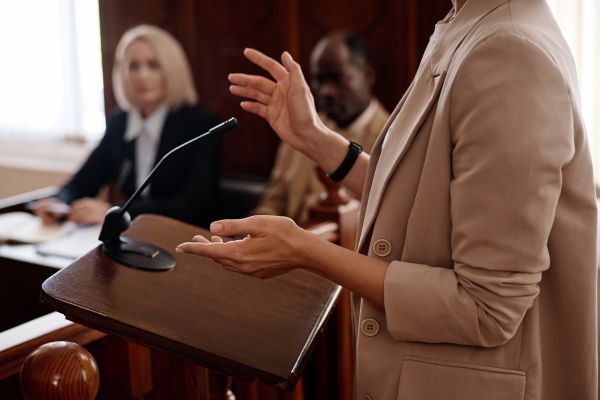What Is Forensic Psychology? Its Impact On Our Legal System
Forensic psychology is the application of psychological science to legal matters and court proceedings. According to the American Board of Forensic Psychology, forensic psychologists serve as the critical bridge between mental health expertise and the legal system, helping courts understand complex human behavior in legal contexts.
Core Functions of Forensic Psychologists:
- Competency evaluations – Determining if defendants can stand trial and understand court proceedings
- Mental state assessments – Evaluating psychological conditions during alleged crimes
- Risk assessments – Predicting likelihood of future criminal behavior for parole decisions
- Expert testimony – Explaining psychological concepts to judges and juries
- Child custody evaluations – Assessing family dynamics in divorce proceedings
Quick Facts:
- Education required: Doctoral degree (Ph.D. or Psy.D.) plus specialized forensic training
- Time to qualify: 7-10 years including undergraduate, graduate, and supervised experience
- Work settings: Courts, correctional facilities, private practice, law enforcement agencies
- Key difference from criminal psychology: Forensic psychologists focus on court proceedings while criminal psychologists study criminal behavior patterns
Forensic psychology professionals use standardized tools like the Minnesota Multiphasic Personality Inventory (MMPI) and risk assessment instruments such as the Static-99R to provide objective, evidence-based evaluations that directly impact legal decisions ranging from criminal sentencing to child custody arrangements. FC Psych Experts specializes in providing these comprehensive forensic evaluations to support legal proceedings.

How Forensic Psychology Works in Our Court System
Forensic psychology applies mental health knowledge and psychological research to legal matters. The American Board of Forensic Psychology defines this field clearly and professionally. They describe forensic psychology as applying psychology science to law and legal system questions. This specialized field helps our courts understand complex human behavior in legal situations. Mental health experts use proven psychological methods to assist with forensic evaluations required for legal decisions.
Criminal cases often require forensic psychology professionals to provide important background information. These experts help courts understand the mental state of people involved in legal cases. They may give expert testimony during court proceedings to explain psychological findings. For example, these professionals might determine if someone understood right from wrong during a crime. This type of analysis helps judges and juries make more informed legal decisions, as supported by guidelines from the American Psychology-Law Society.
Forensic psychologists also handle psychological evaluations for non-criminal legal matters. Child custody evaluations represent one important area where these experts contribute significantly. Their assessments can be crucial factors in determining custody arrangements during divorce proceedings. These evaluations help ensure that children’s best interests are properly considered in legal decisions through specialized attachment and bonding assessments.
Ways Forensic Psychology Helps Our Legal System
Forensic psychologists can offer counseling services to people who have experienced crimes. Their professional responsibilities include many different tasks that support our justice system. These mental health experts work in various settings to provide specialized psychological services, including therapy services for affected individuals.
Checking if defendants can stand trial
Forensic psychologists help courts evaluate accused individuals before legal proceedings. They determine whether defendants understand court processes and can work with their lawyers. These professionals also assess if defendants can follow the judge’s instructions during trials. This evaluation ensures fair legal proceedings for all parties involved. Courts depend on these assessments to make crucial decisions about case progression, following standards set by the American Board of Professional Psychology.
Examining mental state during crimes
These evaluations help courts understand defendants’ thinking during alleged criminal acts. Assessments can reveal whether someone experienced temporary mental health problems while offending. Forensic psychology experts determine if defendants lost contact with reality during crimes. When temporary insanity gets confirmed, judges might order treatment rather than prison time. This approach ensures justice properly considers important mental health factors through comprehensive clinical psychological evaluations.
Assessing future crime risks
Risk evaluations help predict whether convicted people might commit additional crimes later. Psychologists frequently provide these assessments when inmates seek parole or early release. These evaluations examine factors that could lead to repeat criminal behavior patterns. Parole boards use this crucial information to make safer community protection decisions. This process balances public safety with opportunities for offender rehabilitation and reintegration, as outlined by Department of Justice guidelines.
Providing expert court testimony
Forensic psychologists educate courts about complex psychological issues affecting legal cases. They explain difficult mental health concepts that significantly impact trial outcomes. These professionals discuss problems with forced confessions and unreliable eyewitness testimony. They help courts understand how psychological trauma affects human behavior and memory. This expert testimony helps judges and juries make better informed legal decisions, particularly in personal or emotional injury evaluations.
Helping with child custody decisions
Family court evaluations help create appropriate parenting arrangements during difficult custody disputes. Forensic psychology practitioners interview parents and children to gather comprehensive family information. They assess family relationships and determine arrangements that serve children’s best interests. These evaluations provide courts with objective psychological insights about complex family situations. This information helps ensure custody decisions prioritize children’s safety and wellbeing through specialized family therapy approaches.
Assisting with jury selection
Some forensic psychologists help lawyers identify potential bias issues in prospective jurors. They work with legal teams during the important jury selection process. These experts help identify hidden prejudices that could unfairly affect trial outcomes. This service ensures defendants receive fair trials from truly impartial jury panels. The psychological insights help create more balanced and just legal proceedings, following ethical guidelines from the American Psychological Association.
Providing prison mental health care
Correctional facility psychologists provide essential mental health services to incarcerated individuals. These professionals working in jails and prisons oversee comprehensive psychiatric treatment programs. They create individualized care plans addressing various mental health and substance abuse issues. These experts help inmates manage mental illness while serving their court sentences. This support significantly improves rehabilitation outcomes and reduces institutional behavioral problems.
Differences Between Forensic Psychology and Criminal Psychology
Many people believe forensic psychology and criminal psychology represent the same professional field. However, these two areas of study focus on completely different aspects of legal matters. Criminal psychology studies the thoughts and motivations of people who commit criminal acts. These professionals try to understand what drives individuals to break the law. A criminal psychologist might use profiling methods to identify behavioral patterns in criminals.
Forensic psychology practitioners focus their work more closely on supporting courtroom proceedings. They conduct mental health evaluations and provide testimony during legal trials. Forensic psychologists may also offer guidance for resolving legal disputes like custody battles through co-parenting counseling. Their work directly supports judges and lawyers in making important legal decisions. This field bridges the gap between psychology and the legal system effectively, as recognized by the American Academy of Forensic Psychology.
Tools That Forensic Psychology Professionals Use
Forensic psychology practitioners blend clinical psychology skills with legal system knowledge effectively. They use several different tools to complete their professional responsibilities accurately. These specialized tools help them gather reliable information for court proceedings. The combination of various assessment methods ensures comprehensive psychological evaluations for legal cases, including specialized neuropsychological evaluations.
- Mental health evaluations – These detailed assessments provide important information about someone’s psychological condition. The evaluations help courts understand how mental health affects legal matters significantly. These assessments examine various aspects of psychological functioning and behavioral patterns. Mental health evaluations give judges crucial context for making fair legal decisions.
- Standardized psychological tests – These tests add valuable information to support findings from clinical evaluations. Some widely used examples include the Minnesota Multiphasic Personality Inventory personality assessment. Another common test is the Wechsler Adult Intelligence Scale for measuring cognitive abilities. These standardized tools provide objective measurements that courts can rely on confidently, particularly in psychoeducational testing contexts.
- Future behavior assessments – These evaluations help judges understand the chances that someone will commit crimes again. For example, the Static-99R assessment predicts reoffense likelihood for certain types of criminals. These tools examine risk factors that might lead to future criminal behavior. Risk assessments help courts make safer decisions about sentencing and parole considerations.
- Background interviews – This interview type involves speaking with family members, friends, or colleagues of defendants. These conversations help confirm or question official statements made during legal proceedings. Background interviews provide additional perspective on someone’s character and typical behavior patterns. They give courts a more complete picture of the individuals involved in cases.
Forensic psychologists document their findings in detailed written reports for court use. These formal reports present psychological information in ways that legal professionals can understand, following standards for continuing education guidelines in forensic practice.
Challenges That Forensic Psychology Professionals Must Handle
Forensic psychology practitioners have a special role that combines medical knowledge with legal expertise. Collecting information for court proceedings creates several challenging ethical and professional situations. These challenges require careful attention and professional judgment to navigate successfully. The complex nature of legal work makes these situations particularly difficult to handle.
Maintaining objectivity becomes difficult when one legal side provides payment for services. Professionals must focus on presenting factual information rather than advocating for clients. They need to remain unbiased despite financial relationships with legal teams. This challenge requires strong professional ethics and clear boundaries between payment and testimony, as addressed by National Alliance on Mental Illness advocacy efforts.
Privacy protections decrease significantly because important information discovered during evaluations may reach judges. Warning signs or new evidence found during assessments can become part of court records. This reduced confidentiality differs greatly from traditional therapy or counseling relationships. Clients must understand that their statements may not remain private in legal contexts, which is why specialized reunification counseling requires careful ethical consideration.
Role conflicts arise when forensic psychologists try to serve multiple functions for clients. For example, someone providing therapy should not also conduct legal evaluations for clients. These dual relationships can compromise professional judgment and create ethical problems. Clear role boundaries help maintain professional integrity and avoid conflicts of interest.
Getting proper informed consent remains essential for forensic psychology practitioners working within legal systems. People undergoing psychological testing need complete information about evaluation purposes and procedures. They must also understand that their statements and test results may not stay confidential. This transparency helps ensure that people make informed decisions about participating in evaluations.

Education Requirements for Forensic Psychology Careers
Working in forensic psychology requires extensive specialized training and advanced academic preparation. Licensed professionals must also show excellent analytical thinking abilities for various tasks. These tasks include counseling crime victims and providing expert testimony in court proceedings. The demanding nature of this field requires comprehensive educational preparation and ongoing skill development, as regulated by the Florida Board of Psychology.
- Educational Background – Most forensic psychology practitioners earn doctoral degrees in psychology from accredited university programs. They usually obtain either a Doctor of Philosophy degree or a Doctor of Psychology degree. These advanced programs provide the deep knowledge needed for this specialized field. Doctoral training includes both theoretical coursework and practical hands-on experience in clinical settings.
- Professional Licensing – Individual states set specific licensing requirements for all clinical psychology professionals in their jurisdictions. Becoming a forensic psychologist requires meeting these licensing standards plus additional specialized training requirements. Many locations also require completing a certain number of supervised clinical practice hours. These requirements ensure that professionals have adequate experience before working independently with clients.
- Specialized Certification – Forensic psychologists can pursue board certification through the American Board of Forensic Psychology. They may also seek certification from the American Board of Professional Psychology. Obtaining board certification shows that professionals understand human behavior and possess advanced psychological knowledge. This additional credential demonstrates expertise beyond basic licensing requirements and enhances professional credibility. Learn more about our team of board-certified forensic psychologists.
Where Forensic Psychology Professionals Work
Forensic psychology represents a specialized field with professionals working in many different professional environments. These various workplace settings offer forensic psychologists opportunities to apply their skills effectively. The diversity of work environments shows how valuable forensic psychology is to society. Each setting provides unique challenges and opportunities for professional growth and development.
- Court systems and judicial facilities
- Correctional institutions and detention centers
- Private consulting practices and forensic evaluation firms
- Law firms and legal organizations
- Federal agencies like the FBI, DEA, and local police departments
- University research laboratories and academic psychology departments
Changes Coming to Forensic Psychology
Forensic psychology continues evolving because of advancing technology, social science research, and legal precedents. This field adapts constantly to meet new challenges and opportunities in society. New developments continue emerging that will shape the future of this profession. These changes create exciting possibilities for forensic psychology professionals and the legal system.
- Digital evidence analysis including online posts, cyberbullying proof, and internet activity records for court cases
- Brain imaging tests, neurological scans, and other medical examinations that lawyers use to support legal arguments
- Trauma-informed approaches that explain how traumatic experiences can affect victim or defendant perspectives
- Artificial intelligence programs that identify behavioral patterns, though ethical concerns about AI use remain debated
Technology’s Impact on Digital Evidence Analysis
Technology has transformed many professional fields, and forensic psychology is no exception to this trend. Advanced digital tools continue developing rapidly, requiring forensic psychologists to adapt to these changes. Forensic psychology professionals must stay current with these technological advances to remain effective. Their job responsibilities have already started expanding to include new technology-related duties and skills, including approaches like cognitive behavioral therapy adapted for digital contexts.
- Evaluating cybercrime cases – Forensic psychology practitioners collaborate with investigators to understand cybercriminal thinking patterns. They use psychological knowledge and online disinhibition concepts to analyze digital criminal behavior. Online disinhibition describes how people often act more aggressively in digital environments. This understanding helps law enforcement agencies develop better investigation strategies and prevention programs.
- Studying digital behavior patterns – Artificial intelligence tools help experts examine online conversations and social media posts. These tools can identify potentially threatening or concerning behavioral patterns in digital communications. When AI systems detect possible threats, forensic psychologists work with cybersecurity experts for deeper analysis. This collaboration helps identify real threats while avoiding false alarms in digital monitoring systems, as supported by Mental Health America resources.
- Examining social media evidence – Courts now frequently consider tweets, Facebook posts, and internet search histories as evidence. Psychologists work to understand what online activities reveal about people’s mental states and relationships. They analyze digital behavior to determine its relevance to legal violations or character assessments. This analysis helps courts make more informed decisions about digital evidence in legal cases, particularly relevant in immigration evaluations involving social media activity.
Conclusion
Forensic psychology plays a vital role in modern legal systems by bridging mental health expertise with courtroom needs. These professionals help ensure fair trials through competency evaluations, risk assessments, and expert testimony about complex psychological issues. Their work extends from criminal cases to family disputes, making legal decisions more informed and just. As technology advances, forensic psychology continues adapting to include digital evidence analysis and cybercrime investigation.
The field demands extensive education, specialized training, and ongoing professional development to maintain high ethical standards. Whether working in courts, correctional facilities, or private practice, forensic psychologists face unique challenges requiring careful navigation. Their contributions significantly impact how our justice system understands human behavior and makes critical legal decisions. The future of forensic psychology promises continued growth and innovation in serving society’s legal and mental health needs. Contact us to learn more about how forensic psychology services can support your legal case.
FAQs
What does a forensic psychologist do on a daily basis?
Forensic psychologists conduct mental health evaluations, write court reports, and provide expert testimony in legal cases. They also assess defendants’ competency to stand trial and evaluate risks for future criminal behavior.
How long does it take to become a forensic psychologist?
The educational path typically requires 7-10 years including undergraduate studies, doctoral degree, and supervised clinical experience. Most states also require additional licensing requirements and specialized forensic psychology training before independent practice.
What’s the difference between forensic psychology and criminal psychology?
Criminal psychology focuses on understanding why criminals commit crimes and their behavioral patterns through profiling techniques. Forensic psychology concentrates on supporting legal proceedings through evaluations, testimony, and court-related psychological services.
Do forensic psychologists work only with criminals?
No, forensic psychologists work on various legal matters including child custody disputes, personal injury cases, and competency evaluations. They also provide therapy to crime victims and conduct jury selection assistance for legal teams.
Is everything I tell a forensic psychologist confidential?
Unlike regular therapy, conversations with forensic psychologists have limited confidentiality protections in legal contexts. Information gathered during evaluations may be shared with courts, judges, and legal teams as part of proceedings.

